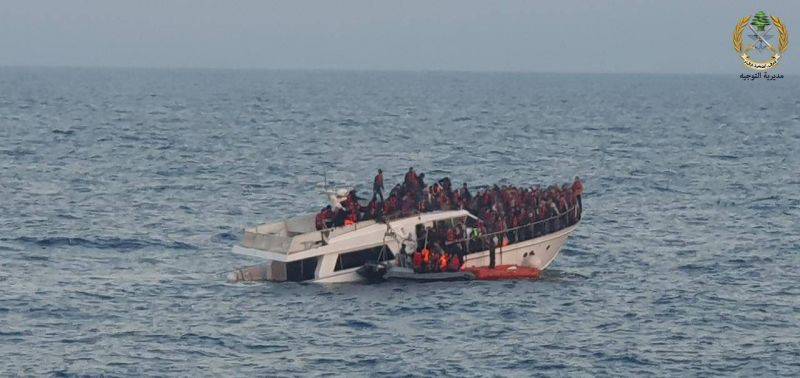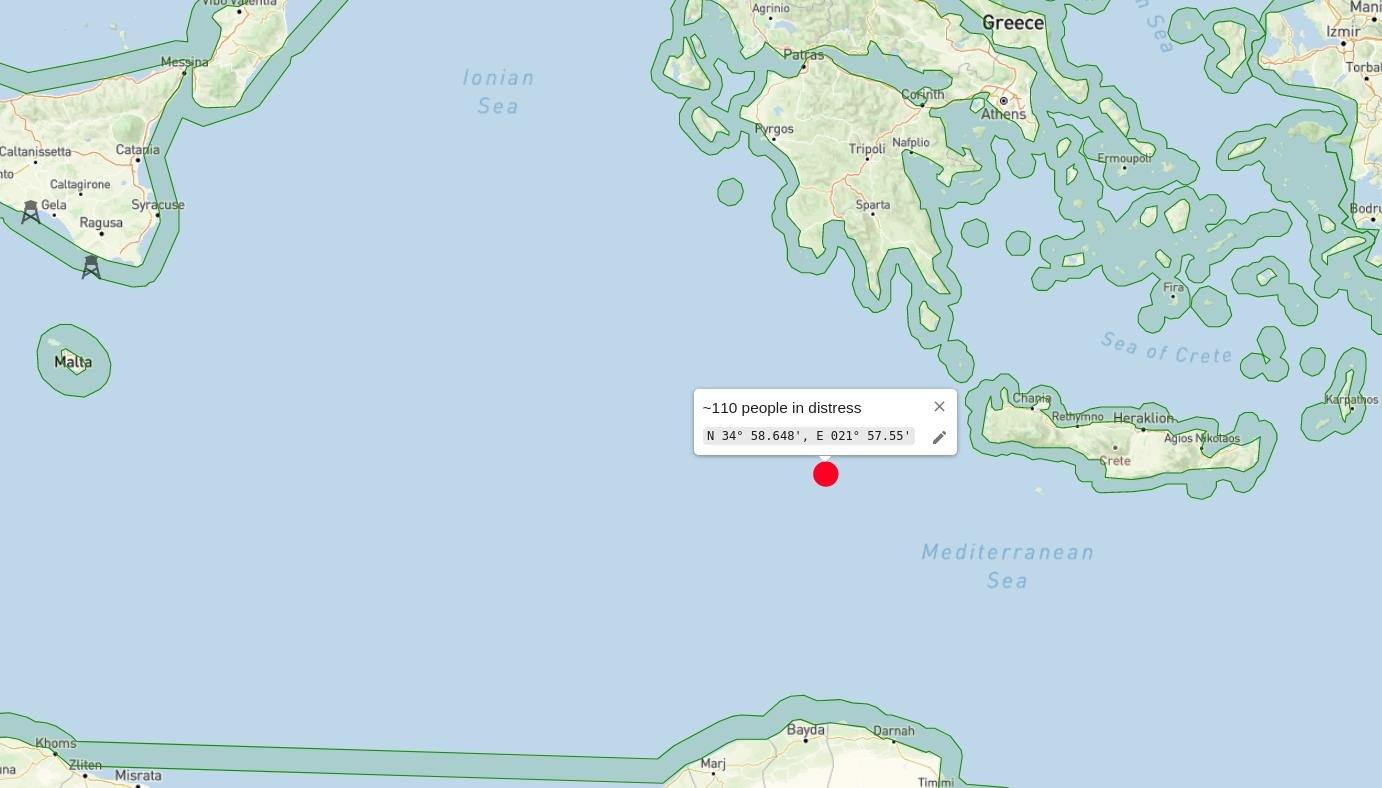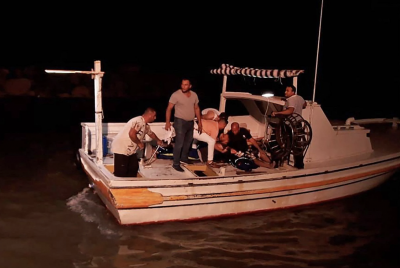
A boat of informal migrants intercepted by the Lebanese Army on Dec. 31, 2022, off Selaata, in northern Lebanon. (Credit: Lebanese Army)
BEIRUT — Libyan militant group Tarek Bin Zeyad Brigade (TBZ) has abducted 110 migrants, including 37 children, who took to sea off the coast of Abdeh in Lebanon's Akkar governorate, and has demanded ransom, activists close to the incident said.
Though such incidents reportedly happen on a regular basis in the Mediterranean, this is the first time it targets a migrant boat departing from Lebanon.
Alarm Phone, an activist network that alerts and urges authorities to rescue distressed migrants in the Mediterranean and Aegean Seas, and Lebanese lawyer Mohammad Sablouh, who regularly represents migrants in distress and is closely following the recent incident, confirmed the news to L'Orient Today, adding that the passengers were taken to Libya where they remain imprisoned.
"We think this injustice that we have just witnessed around the boat which departed from Lebanon, carrying migrants who have never even been to Libya before, is absolutely crazy," Corinna Zeitz, a volunteer and spokesperson for Alarm Phone, told L'Orient Today.
TBZ is a militant group affiliated with Major General Khalifa Haftar’s forces and is one of the largest and most influential armed factions within the Libyan Arab Armed Forces. The group has been accused by Amnesty International of committing war crimes.
Ransom for freedom
On Aug. 10, two boats, each carrying 110 migrants, departed Lebanon's northern shore in Akkar, attempting a treacherous irregular sea journey across the Mediterranean toward Italy, Sablouh said.
The Lebanese Army thwarted one of the boats, while the other one managed to cross into regional waters.
Sablouh told L'Orient Today that among the 110 migrants are 37 children, 14 women and 59 men, around 90 percent of whom are Syrians. He added, however, that obtaining precise information from the passengers, now trapped in Libya, and their family members in Lebanon has been complicated.
Upon reaching Malta's Search and Rescue (SAR) area, on Aug. 18 at 3 p.m. Beirut time, the migrants reported to Alarm Phone that a ship displaying a Libyan flag was pursuing them, and armed individuals were firing at their vessel, resulting in an injury to one person on board and failure in one of the boat's engines, a statement by Alarm Phone said.
 A map that shows the location of the migrant vessel which departed from Lebanon on Aug. 10 and reached the Maltese Search and Rescue (SAR) zone. (Credit: Alarm Phone)
A map that shows the location of the migrant vessel which departed from Lebanon on Aug. 10 and reached the Maltese Search and Rescue (SAR) zone. (Credit: Alarm Phone)
However, Sablouh told L'Orient Today that families of the migrants informed him of nine injuries.
"Some of the information could be contradictory as Alarm Phone tries to understand what happened," Alarm Phone's Zeitz said.
Alarm Phone added in its statement that the individuals on board had previously informed the organization that they had sighted a drone hovering above them two days earlier. The organization cross-referenced this information with the flight path of a Frontex drone, which seemed to coincide with their possible location. Frontex is the European border and coast guard agency.
Alarm Phone added that it promptly informed various European Union authorities, including the Maltese, Italian and Greek authorities, about the critical emergency.
Throughout the subsequent hours, the organization continued to alert these authorities "repeatedly," emphasizing the violent attack unfolding within the Maltese and Greek SAR zones and urging a rescue operation, "unfortunately also in vain,” their statement added.
Members of TBZ first took all 110 migrants into Misrata, a city in northwestern Libya, Sablouh said, based on testimonies provided to him by the captives' family members. They were then transferred to a Benghazi detention center, which is close to the port, where they reportedly remain locked up. Zeitz also told L'Orient Today that the detained migrants were in Benghazi, based on testimonies from families.
"It is so imperative that these migrants get released immediately," Zeitz pleaded.
The migrants' family members, who have been in contact with Alarm Phone and Sablouh, have told both parties that they received calls from someone, using a Libyan number, who asked for a ransom of $2,000 to $3,000 per prisoner to let them go.
The man who called the family members had a WhatsApp account where he appeared in a profile picture, which L'Orient Today has seen, wearing a mask, carrying a rifle and standing in front of a flag bearing the slogan of the TBZ brigade.
'A precarious case'
A Syrian man, Wael, who preferred not to mention his last name for security reasons, told L'Orient Today he was on board the second migrant boat that was thwarted by the army on Aug. 10 with three of his children, including a two-month-old infant.
Wael's wife and three of their other children, aged 12, 10 and two, were on board the second vessel and are currently detained in Libya, he recounted.
Wael told L'Orient Today that he, too, had received a call from a Libyan man demanding a $2,000 ransom. "From where can I get this amount of money?" Wael told the man.
Wael added that his wife, whom he was in contact with on Thursday, told him that TBZ decided they would release the captives on Friday.
Zeitz, however, said that Alarm Phone "does not know exactly what is going to happen."
Sablouh also remained uncertain whether or when the migrants will be released. "The day before last they also said they would release them yesterday," but the migrants remain detained.
"This is the first time we deal with such a case where migrants get arrested and the repatriation mechanisms remain vague to us," the lawyer added. "It's a precarious case as we are also not sure whether Lebanon is willing to receive them back in... are they going to stay in Libya? There are many question marks."
A spokesperson for Lebanon's Foreign Affairs Ministry said he currently has no information regarding this matter.
On Aug. 17, the Foreign Affairs Ministry said that "non-Lebanese" emigrants who left Lebanon informally and are sent back to Lebanon will not be received in the country "regardless of their boat's starting point."
Asked how might he arrange for his family's return to either Lebanon or Syria in case they get released, Wael said, "The important thing now is that they release them, we can then take it from there."
'No more human rights in the EU'
Asked whether detaining migrants who had departed from Lebanon might be related to Lebanon's eight-year incarceration of Hannibal Gaddafi, son of the late Libyan dictator Muammar Gaddafi, Sablouh said he does not believe it has anything to do with the Gaddafi case.
In 2015, Gaddafi was kidnapped in Syria by an armed group and taken to Lebanon, where he was imprisoned under murky circumstances.
He remains imprisoned in Beirut, likely in an Internal Security Forces detention center, according to previous L'Orient Today reporting. He is being prosecuted by the Lebanese judiciary for allegedly withholding information concerning the disappearance of the Lebanese Shiite Imam Musa al-Sadr.
Zeitz told L'Orient Today that the recent sea kidnapping incident "is not a random incident or arbitrary kidnapping." She added that it is not the first time that people have been brought in by TBZ to Libya, as the"Libyan militia regularly cruise in Maltese Search and Rescue [SAR] zone, where similar incidents occurred as well as illegal pushback from Maltese waters to Benghazi," a city in Libya.
Zeitz pointed to a similar incident in May when 500 migrants, who were from Syria, Egypt, Bangladesh and Pakistan, were pushed back from the Maltese SAR and taken into a Libyan prison after they encountered an engine failure, according to a joint statement by Alarm Phone, Sea-Watch and Mediterranean Saving Humans.
"It is part of an ongoing war against migration that is collaborated between European member states and Libya, whichever group representing Libya," Zeitz denounced, adding that the recent incident around the migrant boat that departed from Lebanon "falls under a bigger umbrella of abductions in Libya and shows that there no more human rights in the EU anymore."
Sablouh, who has been coordinating with multiple lawyers in Libya in an attempt to facilitate the migrants' release, said he learned that Libyan militant groups habitually announce that they arrested or thwarted migrants, claiming that this is so "they receive European aid for their efforts in preventing illegal migration into Europe."
The International Center for Migration Policy Development, an organization with 20 European Member States that works on cooperating between countries along migration routes, says it has been supporting the Libyan administration as well as Libyan civil society "in their efforts to develop the necessary prerequisites for effective migration governance geared towards improving the management of migration flows."
In a 2017 communiqué, the European Union Commission said it has adopted additional measures to strengthen its work along the Central Mediterranean migration route, including with and around Libya.
Those measures included at least three million euros in funding for the Libyan Coast Guard and a multi-country program to address refugee issues. The proposal also included supporting Libyan coastal authorities with patrolling and maintenance, as well as "managing migrant flows through the southern Libyan border."
'Most dangerous migration route in the world'
The number of migrants attempting life-threatening informal sea journeys from Lebanon to Europe has increased this summer season, after a low at the beginning of the year, UNHCR Lebanon spokesperson Lisa Abou Khaled recently told L'Orient Today.
The Lebanese Army and security forces have foiled many irregular sea migration attempts so far this summer.
Abou Khaled pointed to Lebanon's crippling economic crisis that started in 2019, among other factors, for the uptick in dangerous sea migration attempts.
The boat journeys continue despite a spate of deadly shipwrecks off the coast of Lebanon and Syria over the past year in which dozens have died on what the UN's migration agency calls the "most dangerous migration route in the world."
"The economic crisis in Lebanon has resulted in a sharp deterioration of the situation of both Lebanese [citizens] and refugees, increasing humanitarian needs and negative coping mechanisms for everyone," Abou Khaled explained.
"Half of the Lebanese population live now below the poverty line, and 90 percent of Syrian refugee families need humanitarian assistance to survive."
"In January-July 2022, there were 14 boats with 1,082 passengers, compared to the same period this year where there were 10 boats, with 535 passengers. Profiles remain the same — overwhelming majority of passengers are Syrian," according to Abou Khaled.
Wael told L'Orient Today that he and his family decided to flee from Lebanon on a migrant boat because "it was impossible to live here anymore."


